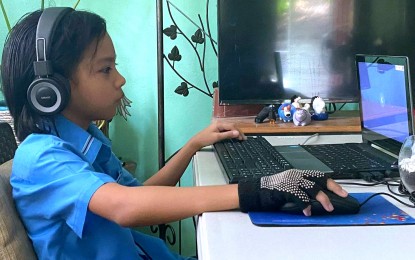
DIGITAL EDUCATION. Senator Win Gatchalian has urged the government to establish a free online library for elementary and secondary learners to augment the existing online library services in the country. These online educational services were launched by government agencies, established libraries, and academic institutions to help students, teachers, and the general public with their information needs after the Covid-19 crisis hit the country. (PNA file photo by Joey Razon)
MANILA – Senator Win Gatchalian wants to establish a free online library for elementary and secondary learners as augmentation to the existing online library services in the country which were created during the outbreak of the pandemic two years ago.
Gatchalian cited the role of digital education tools to ensure learning continuity and help bridge learning gaps created by school disruptions.
“While we return to face-to-face classes, our public libraries, one of the country’s pathways to educational resources, should remain pandemic-proof – ubiquitous and accessible – regardless of the geographical location and type of device used by the learners,” Gatchalian, chairman of the Senate Committee on Basic Education, said in a statement on Sunday.
Online library services were launched by government agencies, established libraries, academic institutions and concerned organizations to help students, teachers, researchers and citizens with their information needs in 2020 after the Covid-19 crisis hit the country.
Under Senate Bill No. 477 or the Philippine Online Library Act, the Department of Education (DepEd) is mandated to create digitized copies of all textbooks and reference books it deems necessary for the public education of our elementary and secondary learners.
These will be compiled in the proposed Philippine Online Library, which shall be jointly managed by the DepEd and the Department of Information and Communications Technology (DICT).
The DepEd and the National Library of the Philippines shall have joint custodies over the digitized copies of textbooks.
Gatchalian pointed out the 2021 World Bank report, which showed that in a commissioned survey of low-income households, 95.5 percent used paper-based learning modules and materials when remote learning was implemented amid the pandemic.
To ensure access to digitized copies of textbooks, the DepEd shall provide computers, laptops, and other appropriate devices to all public elementary and secondary schools nationwide.
On the other hand, the DICT shall provide free, reliable, and secure internet access to all public elementary and secondary schools pursuant to Republic Act 10929 or the Free Internet Access in Public Places Act.
According to a report by UNICEF and the United Nations Educational, Scientific, and Cultural Organization (UNESCO), high, low, and no-tech innovations can be beneficial as schools reopen for mitigating learning losses and provide new resources and learning materials to reach the most marginalized children. (PNA)
